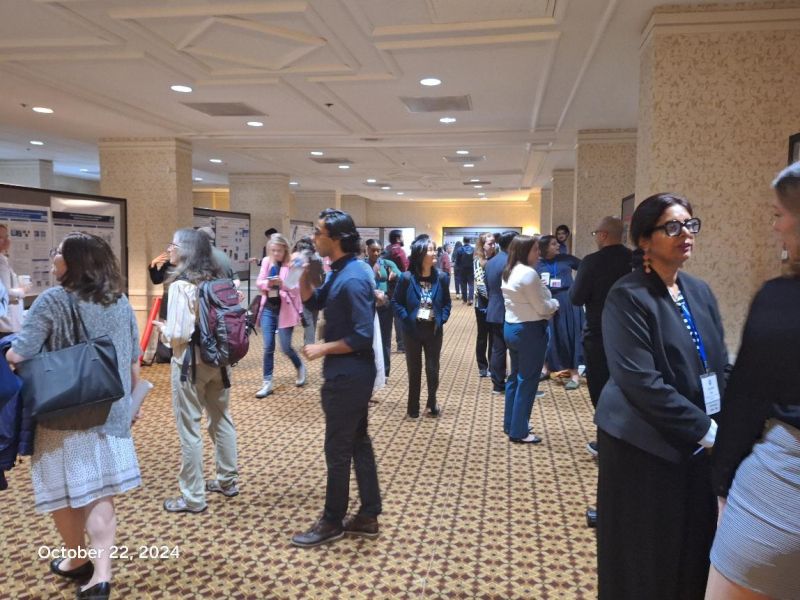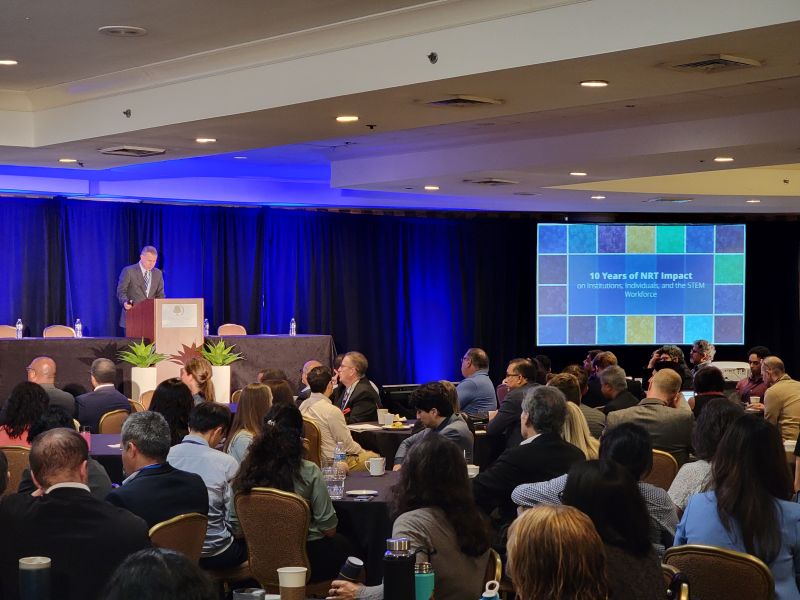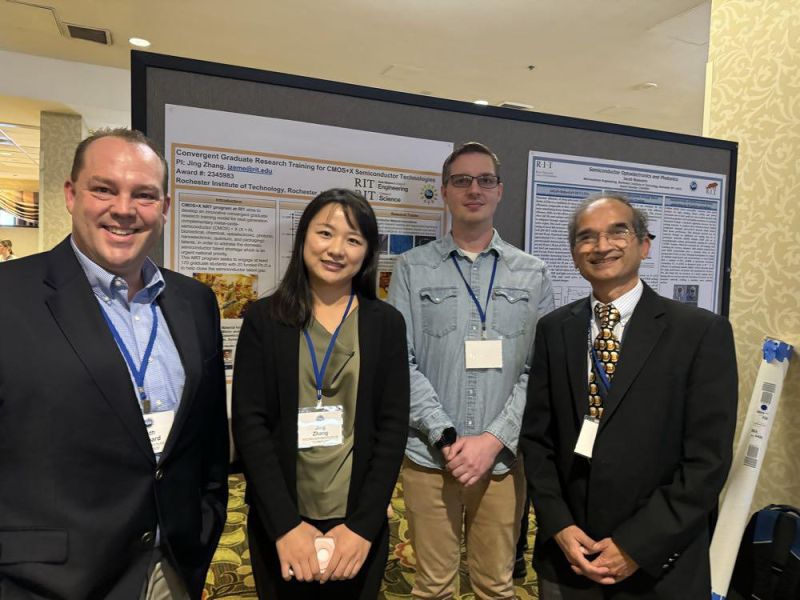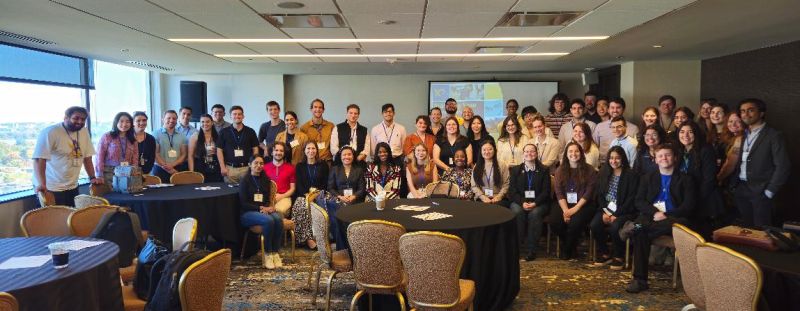Ten years since its launch, the U.S. National Science Foundation Research Traineeship (NRT) program remains firmly grounded in the belief that discovery is powered through collaboration.
At this year's NSF Research Traineeship Annual Meeting — the largest gathering of the traineeship community to date — that foundational belief was reflected more clearly than ever. Over 400 attendees representing more than 120 projects from institutions across the country came together to share strategies for advancing science, technology, engineering and mathematics graduate education through the power of convergent research. Researchers, trainees, evaluators, and partners connected over the three-day conference on ways to support the next generation of diverse STEM leaders prepared to address our society's toughest challenges.
NSF's Director, Sethuraman Panchanathan, kicked off the meeting by emphasizing the NSF Research Traineeship program's extraordinary contributions to creating a stronger, more inclusive STEM workforce — a key priority as NSF nears its 75th anniversary.
"At NSF, we are committed to ensuring science and engineering are the engines of progress, but progress doesn't happen in isolation. It happens through collaboration, creativity and the pursuit of knowledge. The NRT program embodies this mission by preparing the next generation of STEM leaders to tackle the complex challenges of our time," Panchanathan shared in a welcome video.
"I know firsthand the profound impact this program can have, both on the students we mentor and the broader scientific community. As a former NRT principal investigator myself, I experienced how powerful it is to create a space where curiosity thrives, where students are encouraged to ask bold questions, explore new interdisciplinary frontiers and collaborate in ways that truly advance the frontiers of knowledge."
Throughout the meeting, researchers and program leaders highlighted the traineeship's expanding reach over the last decade. Since 2014, the program has invested over $550 million in the STEM workforce through transformational graduate education across the STEM spectrum. Daniel Denecke, NSF's lead program director for the NSF Research Traineeship program, shared the latest key impact data: The program has now surpassed over 200 awards at over 118 diverse institutions across the country based in 46 states, the District of Columbia and the U.S. Virgin Islands. Most critically, it has supported over 5,000 trainees in becoming the STEM leaders of tomorrow, prepared to address the most critical issues facing global communities.
At the meeting, principal investigators (PIs) reflected on how the traineeship experience transforms STEM graduate education in ways that truly empower trainees to become leaders in their fields.
"Gone are the days where a student is just working in his or her own lab. The future has a kind of interdisciplinary convergent skill set requirement, where you have a deep understanding and experience and expertise in one skill, but you have a broader understanding about other skill sets," said Srikanth Pilla, who helped to launch a traineeship project at the University of Delaware focused on leveraging the power of artificial intelligence to transform composite materials manufacturing. "You can only get that through the fantastic platform that NSF has put forth [through the NRT]. The research platform that they helped create will enable us to train students through collaboration."
Vickie DeRose, a University of Oregon-based PI of a NSF Research Traineeship project focused on addressing pressing problems in biological and environmental sensing, agreed that the traineeship's impact comes through the depth and breadth of trainees' cross-discipline experiences.
"Normal graduate programs don't contain those aspects at all," shared DeRose. "I think that the legacy of the NRT is going to be a cadre of scientists going forward into a lot of different positions who can speak a lot of different languages and have a real true appreciation of perspectives from all different areas. They are going to need that because all the areas are changing as we move through new scientific discoveries."
While attendees celebrated the last 10 years of the NSF Research Traineeship program, they also looked ahead to the future. Conference sessions focused on a range of strategies to increase impact in the years to come, including fostering collaboration across projects and institutions, using science communication to grow networks and raise awareness, helping graduate students design and implement career plans, and fostering international research experiences. In an exciting announcement, NSF stated that it will invest another $75 million into the traineeship program to support 25 new projects in 2024 to help foster the next generation of scientists and engineers.
But as always, the heart of the meeting was centered on providing opportunities for trainees. Discussions centered around ways to recruit and retain diverse trainees from underrepresented communities, thus enriching the traineeship experience and opening pathways to the broadest possible range of STEM-focused careers. Throughout the meeting, trainees and project staff presented 150 posters on their research projects, showcasing the innovation emerging from interdisciplinary research and collaboration.
Several trainees offered their perspectives on why the NSF Research Traineeship program has been vital to their graduate experience, and how it will carry them forward in their future careers.
"The interdisciplinary aspect is going to be very, very important. Because, as scientists, we tend to think only in our lens. But it's important to be able to broaden our horizons and think in different lenses. And that's something that the NRT program actively supports," said Roberto Obregon, a third-year doctoral student and trainee in a project at the University of Akron working at the intersection of materials science and machine learning.
"The NRT program has helped open my eyes and is encouraging me to look into my project in multiple ways from multiple lenses and then be able to better communicate what I learn."
Antrelle Clark, a fourth-year doctoral student studying marine biology, is part of a traineeship project at Auburn University that focuses on building climate resilience within the southeast United States. Antrelle explained that going into her graduate program, she had always anticipated working in academia. But when a representative from the U.S. Environmental Protection Agency (EPA) came to speak at an NSF Research Traineeship workshop, she found herself completely inspired, opening a whole new window into future possibilities.
"[The NRT program has] helped me be more outspoken, more outgoing and more open-minded to different job opportunities. Because of that, I now hope to work for the EPA, which is completely different from academia," said Antrelle. She also explained that, for her, the NSF Research Traineeship provided the community support she needed to pursue her dreams.
"Honestly, I would not be where I am today without the NRT program or the people who support me. The main question they always ask is: What can I do to help you? Or: Do you need anything from me? That [support] has been one of the most important aspects of the NRT program for me. And I would not be sitting here today if it was not for them."





